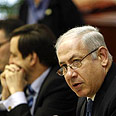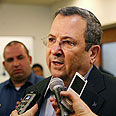


Barak: No humanitarian crisis in Gaza
Government discusses situation in the Strip, briefed by Shin Bet director on Hamas' developing policies – namely a drop in rocket attacks on towns, increase in targeting of troops on border fence. Meanwhile there is little progress on Fatah-Hamas reconciliation front
More aid and supplies are being let through to the Gaza Strip now than in the days before Operation Cast Lead, Defense Minister Ehud Barak said on Sunday at the weekly cabinet meeting when the discussion turned to the situation in the Hamas-controlled coastal enclave.
"There is no hunger in Gaza," Barak said, adding that the only goods not being let through are materials that could potentially be used by terrorist groups, namely building supplies.
Prime Minister Benjamin Netanyahu said that while Israel was being pressured to allow more equipment and supplies in, "we have security interests in Gaza - we do not want to strengthen Hamas, not its fortification abilities, not its cash flow, and of course we want the return of Gilad Shalit… we must find the balance between relief for the population and making it easy for Hamas to rearm."
The prime minister called the current ceasefire "very fragile," and said that Hamas is continuing to smuggle weapons and supplies in from Egypt.
'Hamas focusing on the fence'
Shin Bet Director Yuval Diskin also participate in the discussion, his first with the Netanyahu government. In his briefing Diskin said security forces had noted a drop in the number of terror attacks emanating from Gaza in the period after Operation Cast Lead.
Diskin noted however that alongside the decrease in rocket attacks, there was an increase in attempts to carry out attacks on the border route, mostly roadside bombs.
"Within Gaza Hamas is continuing to increase its strength, manufacturing longer-range rockets and smuggling in rockets of a much superior quality," Diskin said. "They are improving their anti-aircraft and anti-tank capabilities, and expanding tunnels both for defense and offensive purposes."
The Shin Bet chief said that it was in Hamas' interests to maintain the current calm. "That's why the organization is curbing the rocket attacks, there are even examples of operatives who have been arrested for launching (rockets). Hamas is responding to (IDF) activity near the fence with mortar shells, but rocket fire that goes beyond that may harm them, so they are operating within the limits of the border."
Diskin said that Egypt is continuing to act against smuggling from its territory into Gaza, and there has indeed been a decrease. This effort has included the arrest of several Egyptian officers who were involved in the smuggling.
"However," he stressed, "the smuggling continues, they have not destroyed the motivation for smuggling."
Diskin also discusses internal affairs within Hamas, and noted that there is substantial tension between the political leadership and the armed wing, which is interested in strengthening its force and maximizing the number of prisoners that will be released as part of the Shalit deal.
At present the exiled political leaders in Damascus are supporting the military wing over the political leadership.
As for Fatah-Hamas relations, Diskin said that the fifth round of talks between the warring Palestinian factions yielded only partial results. "The gaps are substantial," he said, explaining that Hamas wants a joint committee while the Palestinian Authority wants a unity government that would also control the Gaza Strip.
"Fatah isn't interested in reconciliation," he said.















